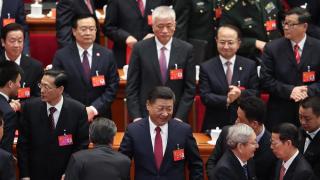China takes the long view and is assiduously planning its Great Rejuvenation while democratic governments think only as far as the next election. Chinese leader Xi Jinping is a master strategist who has consolidated his power beyond the traditional two-term limit while President Donald Trump — who yesterday slapped tariffs on about $278 billion of Chinese imports to take effect next Monday — is raging even as the US retreats as leader of the free world.
A narrative straight out of Beijing’s public affairs bureau, it is the perspective shared by some of our living former prime ministers, retired foreign affairs officials and China watchers. But if you separate propaganda from the facts, that view is simplistically premature. Most likely, it is wrong.
Let’s put China’s best card on the table: the expectation it will become the dominant economic superpower in the region and world. Beijing has two related masterplans to that end: the Made in China 2025 blueprint, and the Belt and Road Initiative.
Reform would strike at the heart of the Communist Party’s role in Chinese the economy and society and necessitate a fundamental restructuring of the country’s political economy.
MIC 2025 is Beijing’s plan to transform the country into a hi-tech superpower by dominating advanced industries such as robotics, next-generation information technology, aviation, advanced materials and green energy. The plan is not just to join the ranks of advanced economies such as the US, Europe and Japan but to leave them in China’s wake.
MIC 2025 is based on the twin pillars of Chinese “self-sufficiency” and Chinese domination of global exports in these sectors. Beijing has set a target of achieving 70 per cent self-sufficiency in core components and basic materials essential for these advance sectors — which, by the way, is against World Trade Organisation rules.
China has yet to adequately confront or overcome limitations intrinsic to its state-led political economy. It needs more robust intellectual property rights, which would reward innovation and risk. Its economy must allow creative destruction, which would see the best firms thrive and less deserving ones fail. Lending and investment decisions must be based on commercial reasoning rather than the purpose of meeting political objectives.
Reform would strike at the heart of the Communist Party’s role in Chinese the economy and society and necessitate a fundamental restructuring of the country’s political economy.
Detested by Democrats for almost everything else, there is bipartisan political and popular support in Washington for Trump taking on China.
Unable to go it alone, MIC 2025 works only if international collaboration offers Chinese firms the lion’s share of benefits and advanced economies agree to further lower barriers even as China raises more of its own. It needs other global economic powers to remain compliant suckers.
They won’t. American threats of escalating tariffs against Chinese goods is really about demanding reciprocity and payback for IP theft. Detested by Democrats for almost everything else, there is bipartisan political and popular support in Washington for Trump taking on China. While Trump’s needless salvos against other trading partners is hardly conducive to getting similarly aggrieved nations on side, advanced economies in Europe and northeast Asia are as resentful with respect to Chinese mercantilist policies even if they remain on the sidelines of the US-China fray for the moment.
What is becoming clear is that global pushback against China is only beginning.
What is becoming clear is that global pushback against China is only beginning. A similar dynamic is playing out with respect to the BRI. Promoted as a vast infrastructure investment scheme to increase prosperity throughout Eurasia and the Indo-Pacific, nations are catching on that the promises of trillions of dollars are inflated. Worse, the BRI increasingly is being blamed for burdening smaller nations with unsustainable debt, entrenching rather than lessening corruption, delivering disproportionate benefits to Chinese companies, and negative social and environmental impacts.
The “Chinese port” of Hambantota in Sri Lanka has become exhibit A in terms of suspicion that the BRI is a platform through which indebted nations mortgage their sovereignty to China. Malaysia was once an enthusiastic recipient of Chinese largesse, but Malaysian Prime Minister Mahathir Mohamad calls it “a new version of colonialism”. The EU sees the BRI as a scheme to divide Europe and advance Chinese strategic and commercial objectives rather than as an act of economic benevolence. European co-operation is needed if China is to redefine Eurasian markets, rules and standards as Beijing hopes to do.
Under Xi, China has been reigniting age-old territorial disputes or doubling down on selective and even fabricated history to justify extended claims. In doing so, Beijing has managed to alienate every significant naval power in the Indo-Pacific, which all happen to be US allies or security partners.
Finally, China’s strategic grand plan of easing the US out of the region by weakening its alliances and partnerships has gone even worse than the economic masterplans. In the last decade of the previous century, a wiser and more cautious China concluded relatively generous treaties with Russia, Kazakhstan, Kyrgyzstan and Tajikistan to resolve border disputes and improve ties. With relations smoothed over, China’s economic weight eventually allowed it to replace Russia as the most significant player in Central Asia. Under Xi, China has been reigniting age-old territorial disputes or doubling down on selective and even fabricated history to justify extended claims. In doing so, Beijing has managed to alienate every significant naval power in the Indo-Pacific, which all happen to be US allies or security partners. Although Chinese strategists long have feared the formation of a hostile maritime coalition of great powers, Beijing’s hubris is pushing these countries in that direction.
The Trump administration has made needless errors such as withdrawing from the Trans-Pacific Partnership, but these and other mistakes can be rectified by this administration or the next.
China’s mistakes are far more serious and consequential because they cause countries to balance against rather than welcome its Great Rejuvenation. Even Chinese commentators are now openly accusing Xi of overreach.
Who said autocrats have decisive strategic advantages over the muddling democracies?






